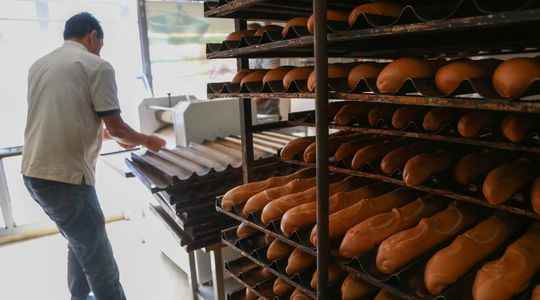From mid-morning, the La Pralinoise bakery is out of stock. “For today, the last batch of baguettes will be ready in thirty minutes,” warns the baker, in the Tunis station district. It’s only 10:30 am and Saïda joins about fifteen other customers who are about to wait half an hour. She takes the opportunity to talk about her favorite recipes: “My specialty is Tunisian macaroni, pasta drowned in a spicy sauce. The wheat flour baguette is best suited: the crumb is softer, it soaks better the sauce”, explains the mother of the family on this Sunday morning in March.
But around her, another subject of conversation dominates: the war in Ukraine which already affects the daily lives of 12 million Tunisians. For three weeks, the fear of a persistent shortage has been growing because, in the Maghreb, wheat comes mainly from two countries : Russia and Ukraine. “The latter together represent 30% of world wheat trade, more than half of which is destined for North and sub-Saharan Africa”, explains the Franco-Senegalese Abbas Jaber, president of the Advens-Geocoton group, giant of the agribusiness in Africa. Unsurprisingly, the conflict was a game-changer. The four strategic ports of Ukraine, including Odessa, on the shores of the Black Sea, are at a standstill. As a result, wheat prices doubled and reached an unprecedented level.
A disaster for Tunisia, which imports 72% of its wheat from abroad, half of which from Ukraine according to the UN trade statistics database, UN Comtrade. A staple (a Tunisian eats 74 kilos of bread per year, compared to 58 kilos for a Frenchman), wheat is entirely managed by the authorities via the Cereals Office, which has a monopoly on buying and selling. But the State, whose coffers are empty, is no longer able to play its role of regulator. The 2022 budget provides for a debt of 20 billion dinars (6.2 billion euros), but in the absence of an agreement with the International Monetary Fund, Tunisia still cannot borrow on the international markets at a bearable rate.
“It’s a vicious circle, says analyst Chedly Kayouti. The Cereals Office no longer receives the necessary money from the State. It can no longer pay the flour mills, hence the current shortage of bread, which had begun before the Russian invasion of Ukraine. But the situation will worsen in June, when it will be necessary to fill the strategic stock of cereals on the international market at a time when prices are exploding.”
The fear of new “bread riots”
With the approach of Ramadan, at the beginning of April, concern is growing. Especially since a black market has been set up: the flour that must be used to make bread is diverted to feed livestock, because the import of animal feed has become unaffordable for the average breeder. “The quintal of flour costs 45 dinars, compared to 75 dinars for classic animal food. There is no picture,” summarizes Béchir Mestiri, president of the agriculture branch of the employers’ union Conect Agri.
Faced with this spiral, the most liberal are calling on the government to lift the wheat subsidies that are weighing down the state accounts. In a country where poverty affects 1 in 5 inhabitants, such a decision could turn into a social bomb. President Kaïs Saïed, who assumed full powers in the summer of 2020 “in the name of the interest of the people”, is playing big. Some fear new “bread riots” if the government takes action.
Between December 1983 and January 1984, thousands of Tunisians took to the streets to denounce a doubling of the price of the baguette. A hundred demonstrators had died before Habib Bourguiba gave up the increase. “The situation is even more explosive today, warns Moez Hassayoun, president of the public policy think tank Joussour. Today, even if the president remains popular, mistrust of decision-makers is even greater. And Ramadan, where Tunisians consume more bread than usual, will multiply the reactions in the event of a shortage or a rise in prices.”
